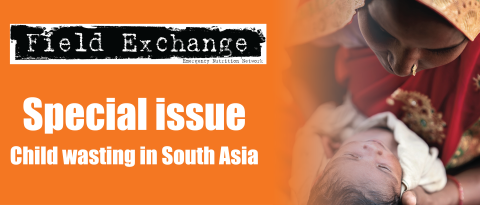South Asia Technical Advisory Group on Wasting
One of the major challenges in improving access for children to services to effectively prevent and treat child wasting in South Asia is evidence. Global normative guidance is largely based on research and evidence from other regions (World Health Organization (WHO), 2013) which some researchers and policy makers argue does not account for the context in South Asian countries.1 For example, there are indications that poor maternal nutrition and low birth weight may be a stronger driver of child wasting (and stunting) in South Asia than elsewhere and that much greater attention to the period between conception and six months is needed to lower the wasting burden. There are also ongoing debates in some countries as to how severely wasted children aged ≥6 months with no medical complications should be treated.
To resolve these issues, and given the very high prevalence and burden of child wasting in South Asia, it is crucial to build a stronger evidence base to inform the policy and programme response in the region. In November 2018, UNICEF convened a consultation of global experts from the Council of Research and Technical Advice on Acute Malnutrition (CORTASAM)2 and experts from the region to discuss the status of policy and programme action to care for severely wasted children in South Asia and to identify evidence gaps and research priorities (UNICEF, 2018). One of the agreed actions at this consultation was to form the South Asia Technical Advisory Group (TAG) for Wasting to support the generation and use of evidence to inform policies and programmes to address wasting in the region.
The South Asia Wasting TAG aims to provide technical leadership and guidance to identify and address critical research gaps on wasting in South Asia. It will also advise on the implications of new evidence for the design of policies and programmes in South Asia and for global normative and operational guidance. Building on existing global and regional research efforts, and working alongside the global CORTASAM, the South Asia Wasting TAG will:
- Identify and prioritise research and knowledge gaps on wasting epidemiology, prevention and treatment that are relevant to South Asia (see the Box 1)
- Support knowledge generation efforts by developing or reviewing research protocols, identifying researchers and academics to collaborate with and coordinating with global and regional donors to resource knowledge generation efforts
- Support the review, interpretation and dissemination of research findings including technical backstopping to emerging country specific and policy dialogue on wasting and severe wasting
- Support the review and validation of interim guidance based on new evidence
Members of the South Asia TAG include representatives from United Nations (UN) agencies, academia, non-governmental organisations (NGOs), donors and technical experts working in South Asia and at global level. It meets biannually and is currently in the process of defining the research priorities on wasting in South Asia.
For more information, please contact rosa@unicef.org
Box 1: Priority research areas of the South Asia Wasting TAG
- Epidemiology of wasting and severe wasting in South Asia (causes and distribution)
- Consequences of wasting and severe wasting on survival, growth and development in South Asia including linkages to stunting and other forms of malnutrition
- Screening and admission criteria to target children who will benefit most from treatment
- Implementation models and packages to prevent and treat acute malnutrition for all children with a focus on the first six months of life
- Cost-effectiveness of alternative approaches (products and implementation models) to treat severe acute malnutrition without medical complications for children 6-59 months
Endnotes
1 See views article in this edition entitled “South Asia and child wasting - unravelling the conundrum”
2 The Council of Research and Technical Advice on Acute Malnutrition (CORTASAM) was assembled with the goal to drive the use of evidence to action in order to ultimately reach more children with effective treatment and prevention programmes. The members of the CORTASAM provide technical leadership to address critical research gaps and support the development of evidence-based operational and normative guidance. It is co-chaired by UNICEF and a leading researcher on wasting and brings together 14 leading academics and researchers.
References
WHO (2013). Guideline: Updates on the Management of Severe Acute Malnutrition in Infants and Children. Geneva: World Health Organization
UNICEF (2018). Wasting in South Asia: Consultation on Building the Evidence Base for the Policy and Programme response. UNICEF Regional Office for South Asia: Kathmandu, Nepal. https://www.unicef.org/rosa/reports/no-time-waste


